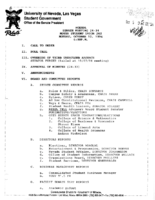Search the Special Collections and Archives Portal
Search Results
Joe Williams Music Scores
Identifier
Abstract
The Joe Williams Music Scores date from 1940 to 1991 and comprise the handwritten musical scores of American jazz musician Joe Williams, born Joseph Goreed. Many of the musical scores are Williams' original arrangements.
Archival Collection
River Mountains Trail Partnership Records
Identifier
Abstract
The River Mountains Trail Partnership Records date from 1995 to 2015 and document the planning and construction of the River Mountains Loop Trail in Clark County, Nevada. The collection contains meeting agendas and minutes, correspondence, project notes, trail maps, land surveys, grant applications, photographic slides of the trail and Lake Mead, environmental assessments, ephemera from National Trails Day, trail guides, interpretive plans, and development reports.
Archival Collection
Karl Carsony Papers
Identifier
Abstract
The Karl Carsony Papers (1918-2011) are comprised of photographs, newspaper clippings, ephemera, and artifacts representing Karl (Schrom) Carsony's acrobatic career and personal life. The bulk of the materials in this collection date from approximately the early 1950s through the late 1970s. The materials also include vacation photographs of Karl (Schrom) Carsony and his wife, Margot Meyers. The materials also include promotional photographs, posters, and fliers for the Carsony Brothers, which was an acrobatic show consisting of Karl Carsony and his twin brothers, Joe and Bert Schrom.
Archival Collection
Vern Lanegrasse Papers
Identifier
Abstract
The Vern Lanegrasse Papers (1961-2010) consist of materials from the Brotherhood of the Knights of the Vine and the California Restaurant Writers Association as well as event programs, menus, and other materials related to food and wine.
Archival Collection
UNLV Libraries Collection of Hollywood Casino Corporation Promotional Materials and Reports
Identifier
Abstract
The UNLV Libraries Collection of Hollywood Casino Corporation Promotional Materials and Reports includes annual reports, prospectus, 10-K forms, 10-Q forms, equity reports, financial research, press releases, press kits, a stockholder meeting notice, and promotional materials for Hollywood Casino Corporation in Dallas, Texas, dating from 1992 to 2001.
Archival Collection
Joseph LaMar Foremaster Photograph Collection
Identifier
Abstract
The Joseph LaMar Foremaster Photograph Collection includes black-and-white photographic prints and negatives of structures at the Old Ranch (Stewart Ranch) in Las Vegas, Nevada from approximately 1920 to 1939 when the Foremaster family lived and worked on the land.
Archival Collection
Aaron Williams Photograph Collection
Identifier
Abstract
The Aaron Williams Photograph Collection (approximately 1968 to 1983) consists of three black-and-white photographic prints. Two of the images are of the groundbreaking ceremony of the Senior Citizens’ Center with Las Vegas, Nevada Mayor Oran Gragson, and the third of three unidentified individuals.
Archival Collection

Wayne Tanaka oral history interview: transcript
Date
Archival Collection
Description
Oral history interview with Wayne Tanaka conducted by Ayrton Yamaguchi, Vanessa Concepcion, Kristel Peralta, Cecilia Winchell, and Stefani Evans on March 12, 2021 for Reflections: The Las Vegas Asian American and Pacific Islander Oral History Project. Wayne shares his family's heritage and history as Japanese Hawaiians and discusses his father's internment during World War II. He shares his background growing up in Lahaina, Maui, Hawai'i and how he came to live in Las Vegas. Wayne discusses his career as an educator for the Clark County School District and talks about his life in Las Vegas with his wife and daughters. Subjects discussed include: Las Vegas Buddhist Sangha; Executive Order 9066; Sunset High School; Boulder Dam Area Council.
Text

David Ober interview, October 11, 2017: transcript
Date
Archival Collection
Description
Tucson, Arizona, native David Ober moved to Las Vegas twice. He arrived reluctantly the first time in 1978 with his parents as a high-school student, when his father, Hal Ober, came to Las Vegas to begin building and marketing the U.S. Home (now Lennar) brand. While the elder Ober soon left U.S. Home to open his own home-building business, R.A. Homes, his youngest child left Las Vegas shortly after his high school graduation to return to his native Tucson, follow in the footsteps of his siblings, and attend the University of Arizona. After graduating from the University of Arizona David Ober opened his own mortgage company and began building a life in Phoenix. In the late 1980s he agreed to take a large pay cut, return to Las Vegas, and learn his father's business from the ground up. At the time, Hal Ober was developing his award-winning, master-planned community, Desert Shores. David Ober, the youngest of the five children of Hal and D'Vorre (Dee) Ober, agreed to participate in the
Text

Meeting minutes for Consolidated Student Senate University of Nevada, Las Vegas, October 10, 1994
Date
Archival Collection
Description
Text
